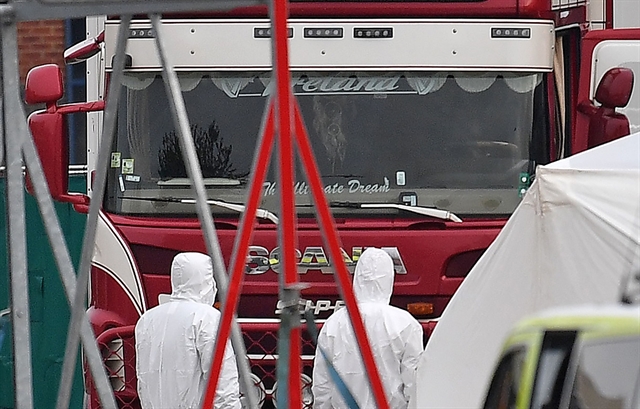 Society
Society


|
| Police investigate the lorry in which 39 dead bodies were found in October in Essex in the south of England. — AFP/VNA Photo |
HÀ NỘI — The families of 39 Vietnamese people found dead in a lorry in England last month will have to cover the costs to repatriate their relatives’ remains, the Vietnamese Ministry of Foreign Affairs said in an official document.
Local authorities in central provinces of Nghệ An and Hà Tĩnh, which were home to the highest number of victims, asked the families whether they wanted repatriation of the bodies or the ashes brought back.
Lê Hồng Vinh, vice chairman of Nghệ An Province's People’s Committee, said the local departments of finance and labour, invalids and social affairs will consult with local authorities to support the families after the bodies are repatriated, the Voice of Vietnam (VOV) reported.
Bùi Huy Cường, vice chairman of Can Lộc District's People’s Committee in Hà Tĩnh Province, said they have collected options of five families in the district on Tuesday morning. All of them want to repatriate their relatives’ bodies intact.
The district’s authorities will help the families go to Nội Bài Airport in Hà Nội to receive the bodies, he said.
VOV reported that almost all of the families want to receive their relatives’ bodies, not ashes.
According to the Ministry of Foreign Affairs, the fee to bring a jar of ashes to Nội Bài Airport is £1,370, or VNĐ41.1 million.
Body repatriation in a coffin made of zinc can cost up to £2,208, or VNĐ66 million.
The ministry asked local authorities to make plans to receive the bodies or ashes and transport them to their hometowns.
The number of coffins and jars and repatriation time will be announced later.
On November 7, the Vietnamese Ministry of Public Security said UK authorities had confirmed the 39 migrants found in the refrigerated container on October 23 on an industrial estate in Grays, Essex in the south of England, were from Việt Nam.
They have permanent residence in Hải Phòng, Hải Dương, Nghệ An, Hà Tĩnh, Quảng Bình and Thừa Thiên-Huế.
Most of them hail from Vietnamese rural areas where cremation is not popular. Bodies are buried several days after death. — VNS




